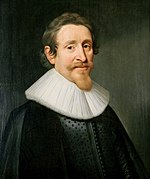
Hugo Grotius
Dutch jurist and scholar (1583-1645)
Edward Teller, known as the “father of the hydrogen bomb,” was a Hungarian-American physicist who made significant contributions to nuclear and molecular physics, including the Jahn-Teller and Renner-Teller effects. He was an early member of the Manhattan Project and co-founded the Lawrence Livermore National Laboratory, but also faced controversy for his role in the Oppenheimer security clearance hearing.
Table of Contents
Edward Tellerwas a Hungarian-American theoretical physicist and chemical engineer who is known colloquially as “the father of the hydrogen bomb” and one of the creators of the Teller-Ulam design based on Stanislaw Ulam’s design. He had a volatile personality, and according to Richard Rhodes in his book Dark Sun, was “driven by his megaton ambitions, had a messianic complex, and displayed autocratic behavior.” A thermonuclear design he devised was an Alarm Clock model bomb with a yield of 1000 MTand proposed delivering it by boat or submarine. It would be capable of incinerating an entire continent. To David Lilienthaltheory have retained their original formulation and are still mainstays in physics and chemistry. According to Freeman Dyson, Teller thought about his problems using basic principles of physics and often discussed with other cohorts to make headway through difficult problems. This was seen when he worked with Stanislaw Ulam to get a workable thermonuclear fusion bomb designbut later temperamentallydismissed Ulam’s aid. Herbert York stated that Teller utilized Ulam’s general idea of compression and heating to start thermonuclear fusion to generate his own sketch of a “Super” bomb that would work. Prior to Ulam’s idea, Teller’s classical Super was essentially a system for heatinguncompressed liquid deuterium to the point, Teller hoped, when it would sustain thermonuclear burning. It was, in essence a simple idea from physical principles, which Teller pursued with a ferocious tenacity even if he was wrong or shown that it wouldn’t work. To get support from Washington for his Super weapon project, Teller proposed a boosted nuclear fission explosion as the “George” shot of Operation Greenhouse.
Teller made contributions to Thomas-Fermi theory, the precursor of density functional theory, a standard modern tool in the quantum mechanical treatment of complex molecules. In 1953, with Nicholas Metropolis, Arianna Rosenbluth, Marshall Rosenbluth, and Augusta Teller, Teller co-authored a paper that is a standard starting point for the applications of the Monte Carlo method to statistical mechanics and the Markov chain Monte Carlo literature in Bayesian statistics. Teller was an early member of the Manhattan Project, which developed the first atomic bomb. He made a serious push to develop the first fusion-based weapons, but ultimately fusion bombs only appeared after World War II. He co-founded the Lawrence Livermore National Laboratory and was its director or associate director. After his controversial negative testimony in the Oppenheimer security clearance hearing of his former Los Alamos Laboratory superior, J. Robert Oppenheimer, the scientific community ostracized Teller.
Teller continued to find support from the U.S. government and military research establishment, particularly for his advocacy for nuclear energy development, a strong nuclear arsenal, and a vigorous nuclear testing program. In his later years, he advocated controversial technological solutions to military and civilian problems, including a plan to excavate an artificial harbor in Alaska using a thermonuclear explosive in what was called Project Chariot, and Ronald Reagan’s Strategic Defense Initiative. Teller was a recipient of the Enrico Fermi Award and the Albert Einstein Award. He died on September 9, 2003, in Stanford, California, at 95.
Edward Teller was a Hungarian-American theoretical physicist and chemical engineer who is known as the ,father of the hydrogen bomb, and one of the creators of the Teller–Ulam design for thermonuclear weapons.
Edward Teller made numerous contributions to nuclear and molecular physics, spectroscopy (including the Jahn–Teller and Renner–Teller effects), and surface physics. He also made contributions to Thomas–Fermi theory, the precursor of density functional theory.
Edward Teller was an early member of the Manhattan Project, which developed the first atomic bomb. He made a serious push to develop the first fusion-based weapons, leading to the creation of the hydrogen bomb.
After his controversial negative testimony in the Oppenheimer security clearance hearing of his former Los Alamos Laboratory superior, J. Robert Oppenheimer, the scientific community ostracized Teller.
In his later years, Teller advocated for controversial technological solutions, including a plan to excavate an artificial harbor in Alaska using a thermonuclear explosive in Project Chariot, and Ronald Reagan’s Strategic Defense Initiative.
Edward Teller was a recipient of the Enrico Fermi Award and the Albert Einstein Award.
Edward Teller died on September 9, 2003, in Stanford, California, at the age of 95.
My experience has been in a short 77 years that in the end when you fight for a desperate cause and have good reasons to fight, you usually win.
Hungarian-American nuclear physicist (1908-2003)
Two paradoxes are better than one; they may even suggest a solution.
Hungarian-American nuclear physicist (1908-2003)
The science of today is the technology of tomorrow.
Hungarian-American nuclear physicist (1908-2003)
No endeavor that is worthwhile is simple in prospect; if it is right, it will be simple in retrospect.
Hungarian-American nuclear physicist (1908-2003)
Physics is, hopefully, simple. Physicists are not.
Hungarian-American nuclear physicist (1908-2003)
Secrecy, once accepted, becomes an addiction.
Hungarian-American nuclear physicist (1908-2003)
A fact is a simple statement that everyone believes. It is innocent, unless found guilty. A hypothesis is a novel suggestion that no one wants to believe. It is guilty, until found effective.
Hungarian-American nuclear physicist (1908-2003)
Life improves slowly and goes wrong fast, and only catastrophe is clearly visible.
Hungarian-American nuclear physicist (1908-2003)
Had we not pursued the hydrogen bomb, there is a very real threat that we would now all be speaking Russian. I have no regrets.
Hungarian-American nuclear physicist (1908-2003)
The main purpose of science is simplicity and as we understand more things, everything is becoming simpler.
Hungarian-American nuclear physicist (1908-2003)
I tried to contribute to the defeat of the Soviets. If I contributed 1%, it is 1% of something enormous.
Hungarian-American nuclear physicist (1908-2003)